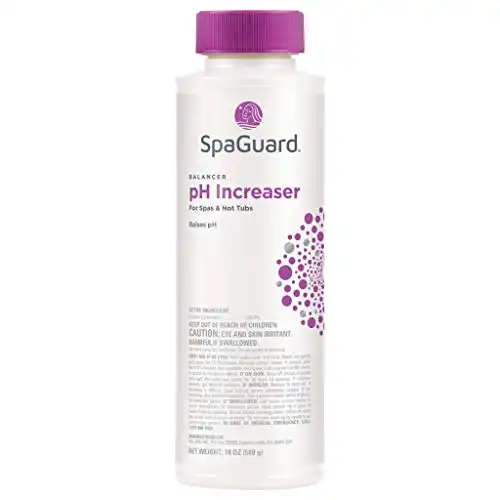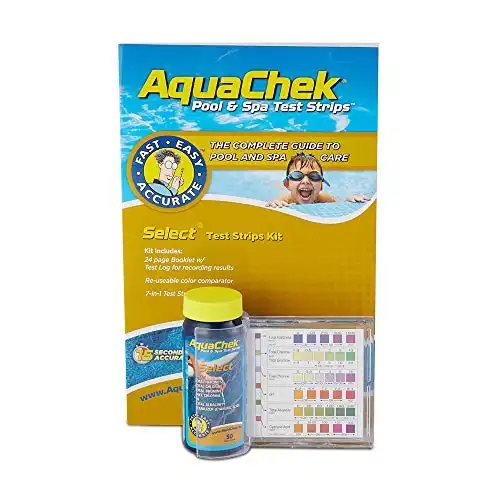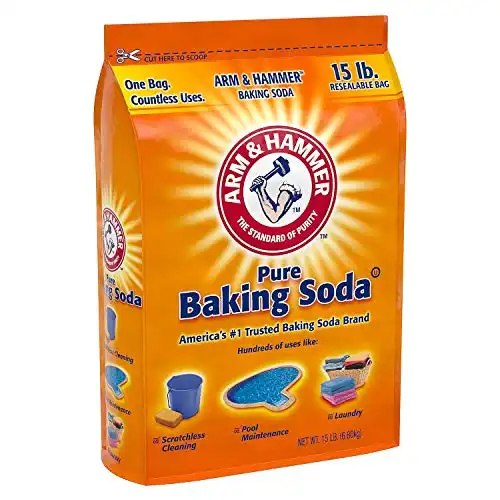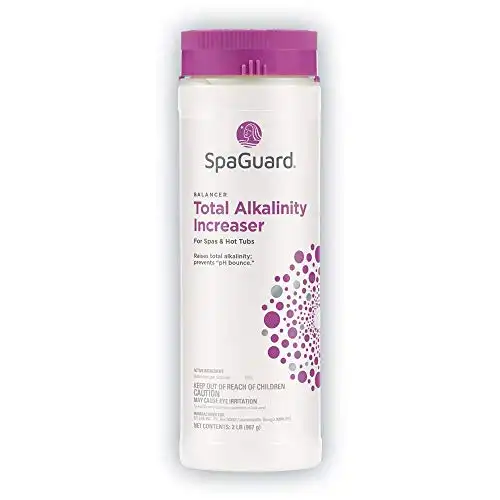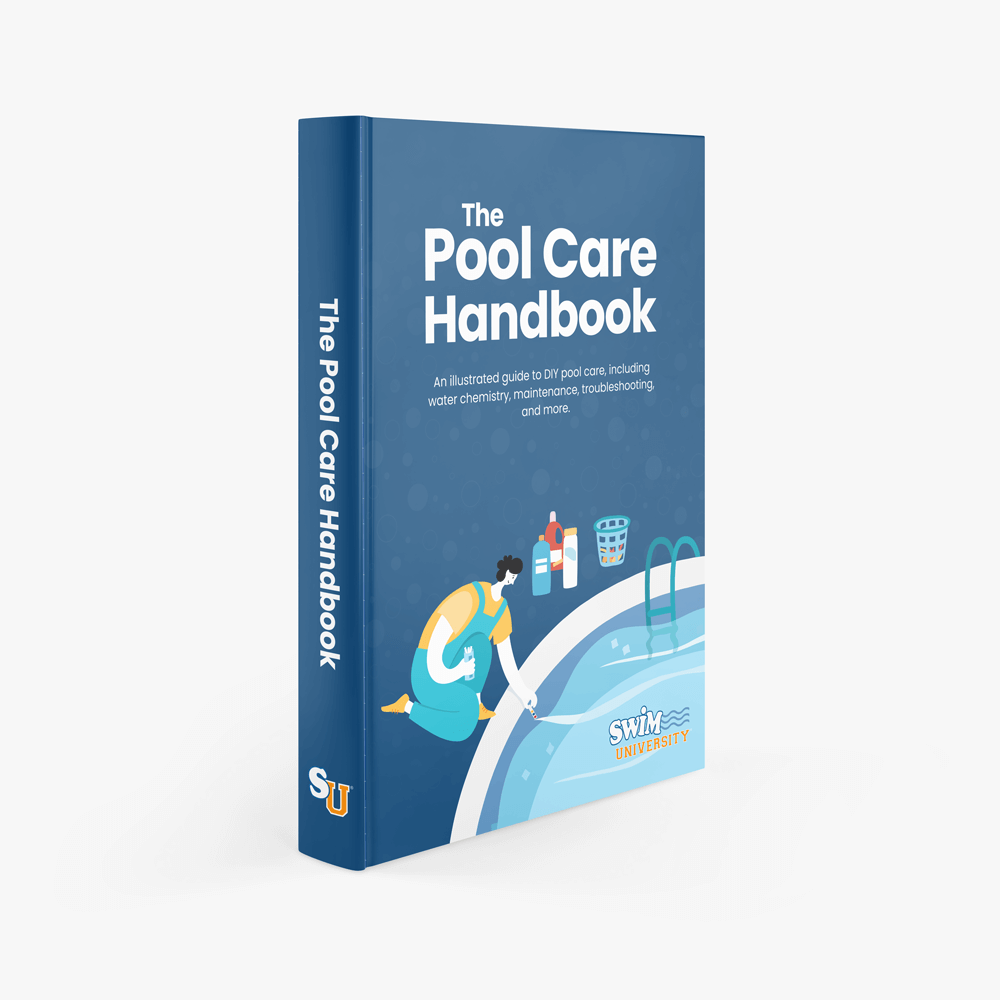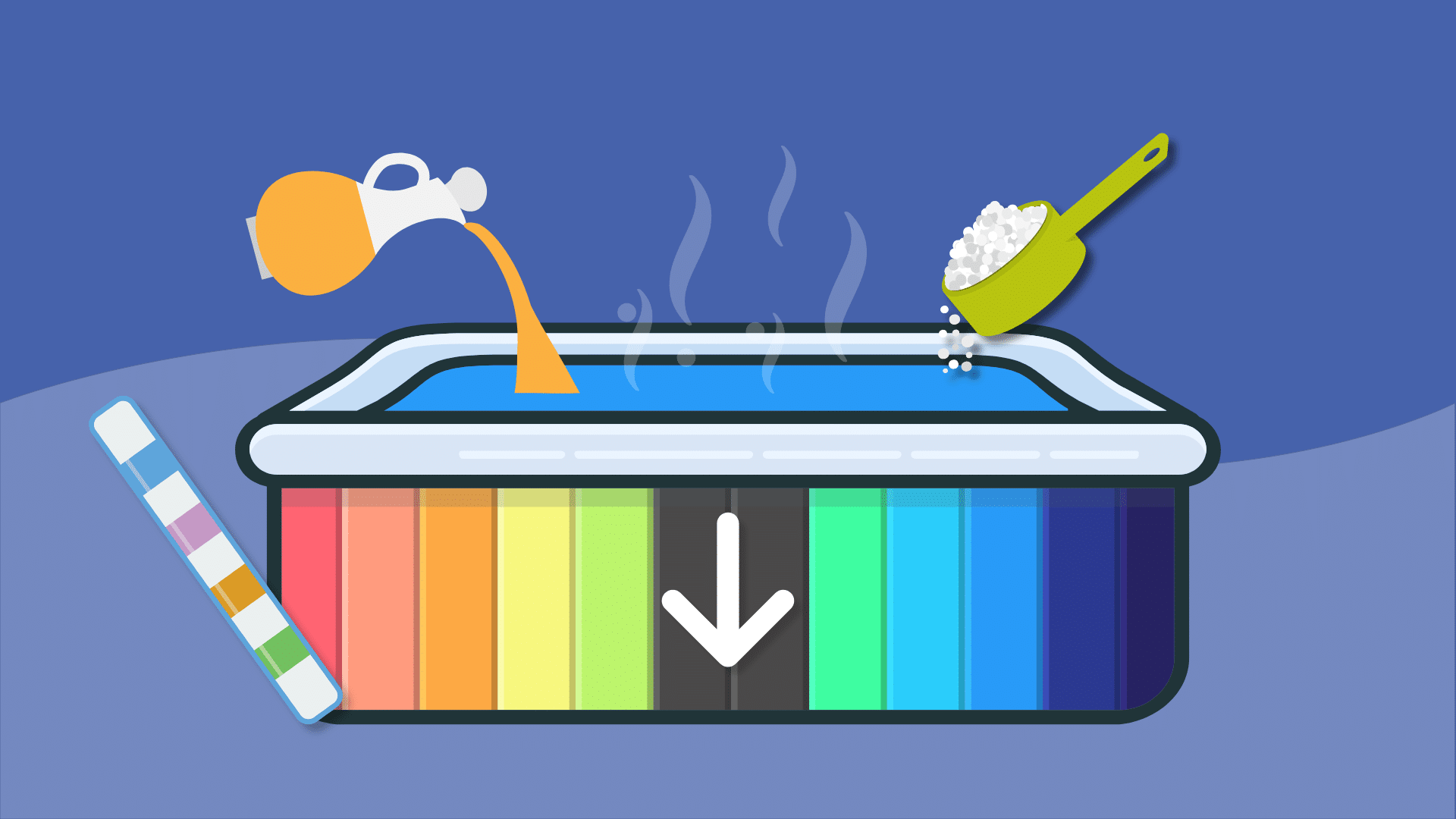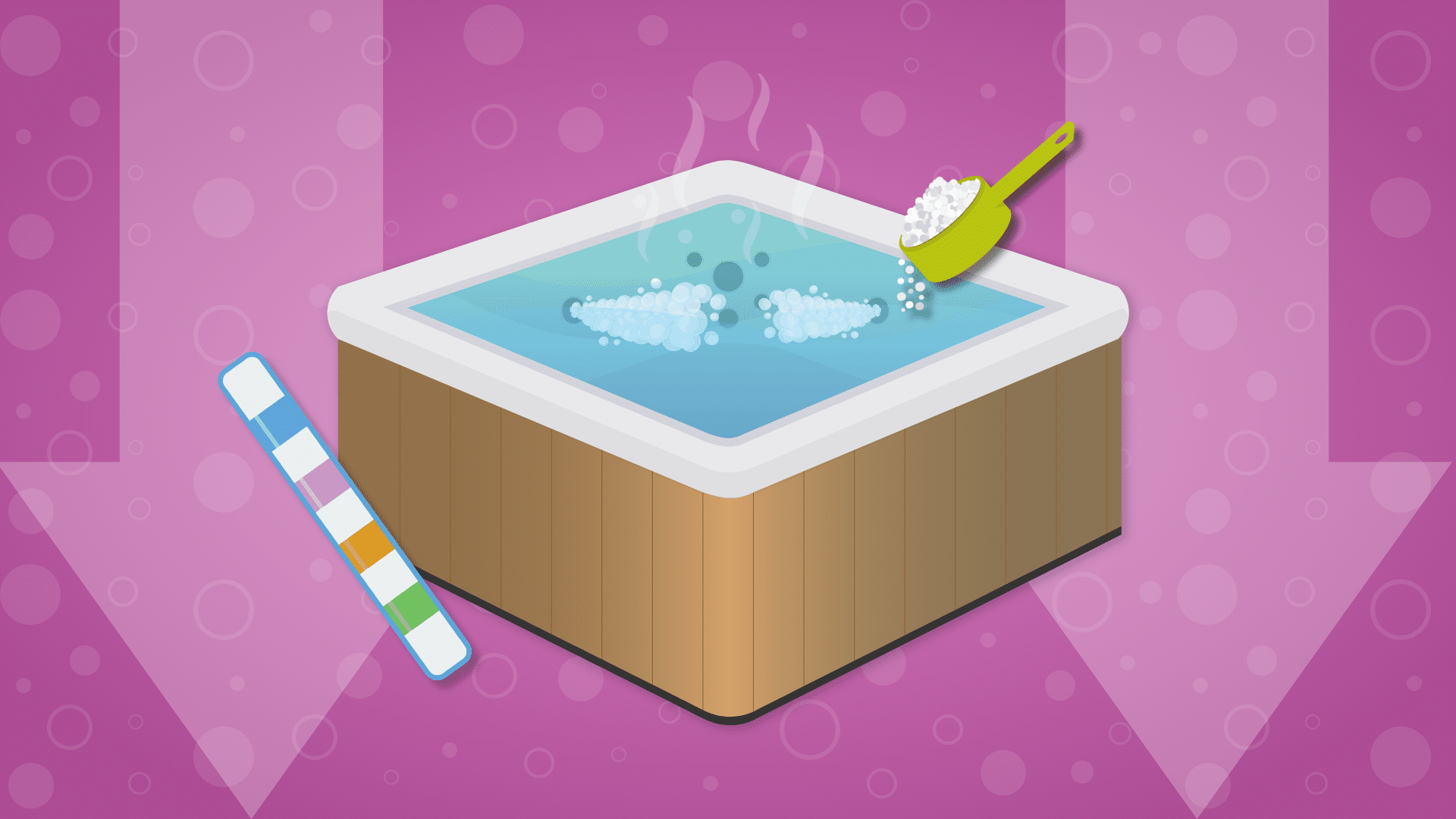How to Raise pH in a Hot Tub
The easiest way to raise JUST the pH in your hot tub or swim spa is to use pH Increaser. This is a chemical designed for hot tubs. It comes in a small bottle, and its active ingredient is sodium carbonate (soda ash). Here’s my favorite brand. 👇
Raise your hot tub pH with a pH increaser. Low pH causes acidic water that can erode your hot tub surfaces and equipment and affect your chlorine or bromine.
This is the same active ingredient found in Washing Soda found in your laundry aisle. But I recommend just buying pH Increaser because Washing Soda is sold in large quantities, and it’s way more than you’ll ever need.
Now, that’s JUST to raise your hot tub’s pH level. But that won’t balance the water chemistry in your hot tub completely. You need to understand the whole picture (which is relatively easy).
If you stick with me through this article, I promise you’ll completely understand how to raise the pH in your hot tub and achieve perfect water balance with ease. Or you can watch this video if you don’t want to read it.
My fool-proof system for keeping any hot tub clean and clear at all times. Our course covers every type of hot tub, including portable spas, inflatable hot tubs, inground hot tubs, swim spas, and more. This is the LAST and ONLY hot tub guide you'll need.
What is pH and Why is it Important for Your Hot Tub?
pH is simply the measurement of how acidic your water is. The lower the water pH, the more it’s like soaking in acidic water. The higher, the drier the water will feel. When you open your eyes underwater, and it burns, that’s caused by low (and high) pH – not chlorine or bromine, as you may expect. But you probably shouldn’t open your eyes underwater without googles.
If your pH is low, it’ll eat away at your hot tub’s parts and plumbing. A vat of acid tends to do that. Chlorine and bromine don’t perform well in hot tub water with low (or high) pH.
So, keeping your water balanced makes the water feel pleasant on your skin and makes your sanitizer more effective. Thus saving you money. But what’s perfectly balanced water mean? And how do you do that?
Understanding the Ideal pH Range for Hot Tubs
The pH (potential of hydrogen) scale is numbered 0 to 14. Zero is battery acid, and 14 is drain cleaner. Both of which would be dangerous to soak in.
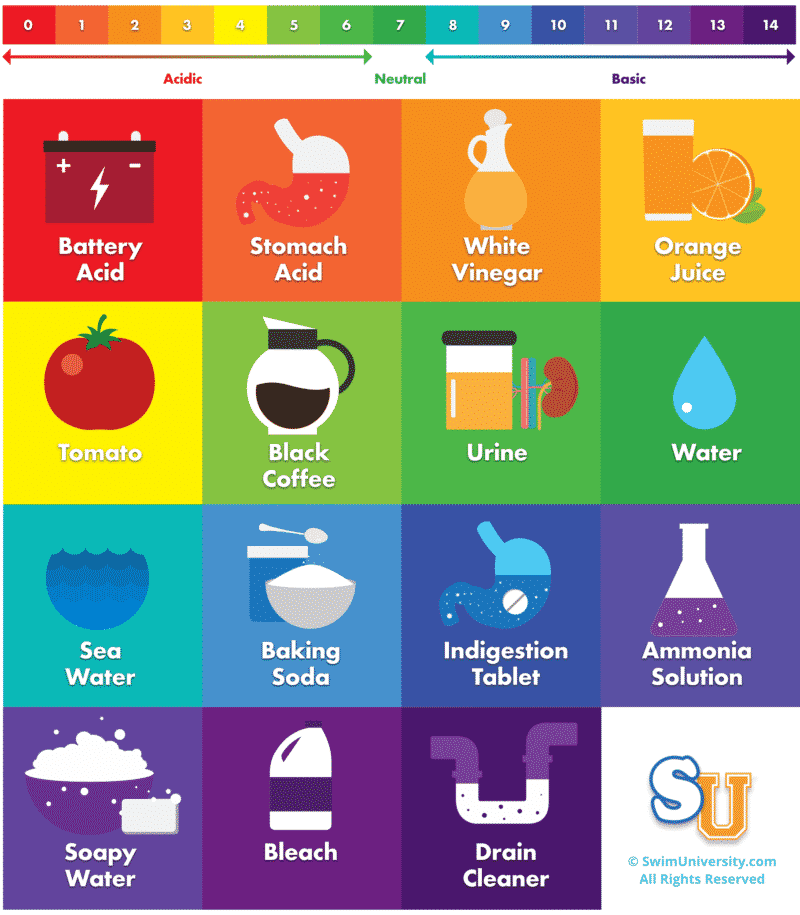
The middle of that scale is 7, which is a perfectly balanced pH. Human tears have a pH of 7, which is why your eyes don’t burn when you cry (unless you’re wearing makeup).
The pH of your hot tub should be between 7.4 and 7.6 (which is only slightly higher than 7. And the best way to find out your pH reading is using a test strip (recommended below).
Tests for 7 important chemistries in seconds: Total Hardness, Total Chlorine, Total Bromine, Free Chlorine, pH, Total Alkalinity, and Cyanuric Acid.
Yes, there are fancy liquid test kits and digital probes that are more accurate, but as a homeowner, we don’t need to be accurate. We’re not chemists. We’re just trying to enjoy a soak. And test strips are cheap, fast, easy, and close enough.
Check your spa water with a test strip at least once a week to make sure your levels are in range.
What About Total Alkalinity?
Ok, here’s where every hot tub owner gets confused. When it comes to balancing your hot tub chemistry, two readings matter: pH and Total Alkalinity.
Think of Alkalinity like pH’s bodyguard. If you have no alkalinity but a perfect pH (7.4 to 7.6), the minute you get in or add chemicals, the pH level will be thrown off. Having alkalinity in your water protects your pH. It takes the hit to keep the pH balanced for longer.
So, along with a perfect pH level, you want your alkalinity level to be correct. Alkalinity is measured in parts per million or PPM. And the scale goes from 0 to as high as 500 ppm. However, the ideal range is 100 to 150 ppm.
A Note About How We Measure pH and Alkalinity
You may see conflicting information about the correct range. Everyone has a different recommendation. We like to stay on the higher end to give you room to breathe and not worry about your readings as much. But if you want, you can keep your pH between 7.2 and 7.8. And your Alkalinity between 80 and 120 ppm).
The Secret to Raising pH in Your Hot Tub
Now that you know alkalinity is essential to protect your pH, you’ll be surprised to learn that it gets simpler. Raising your alkalinity will also increase the pH. And you can raise the alkalinity in your water with baking soda.
Remember I mentioned Washing Soda will raise pH? Baking Soda will raise alkalinity. Check this out…
- Washing Soda = Sodium Carbonate
- Baking Soda = Sodium Bicarbonate
There’s a very slim difference, but it’s important to know. I don’t recommend buying washing soda because I recommend buying baking soda instead.
An affordable alternative to traditional chemicals, baking soda will naturally raise the alkalinity and pH in your water. It's also useful for cleaning tiles and surfaces.
Usually, when your alkalinity is low, so is your pH – and vice versa. So, you may only need to add baking soda to bring up your alkalinity level to between 100 and 150 ppm. And your pH reading should go up, too.
If your pH doesn’t reach the ideal range (7.4 – 7.6), you can use pH increaser (sodium carbonate) to give it a boost.
Raise your hot tub pH with a pH increaser. Low pH causes acidic water that can erode your hot tub surfaces and equipment and affect your chlorine or bromine.
That’s how you raise pH in a hot tub the right way. It’s also the cheapest way. But if your pH is high, here’s our guide on how to lower your pH in a hot tub.
Step-by-Step Guide to Raising Your Hot Tub’s pH
Did you skip all that and jump down to this section to get your answer? Here’s how I would raise the pH in a hot tub perfectly every time.
1. Know Your Hot Tub Size
Before you can test and adjust your water, you need to know how many gallons of water your hot tub holds. Make sure you’re correct. Google your hot tub make and model. If that doesn’t work, call a dealer that sells your hot tub brand to find out. If that doesn’t work, shoot me an email, and maybe we can help you out.
2. Test the Water with Test Strips
Use a test strip. Just dip it and wait 15 seconds to read it. Match up the colors on the back of the bottle. If you’re colorblind, get someone else to read it for you or take a water sample to your local hot tub supply store to get tested.
3. Increase The Alkalinity and pH with Baking Soda or pH Increaser
If your pH and Alkalinity are low, add baking soda using the chart below.
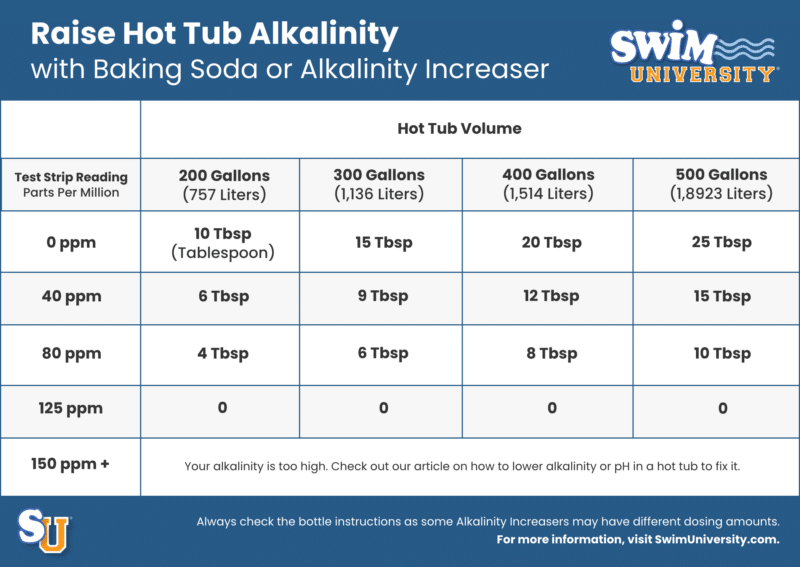
Note: Hot Tub chemical companies sell Alkalinity Increaser. This is just sodium bicarbonate (baking soda) that has a coarser grind. Sometimes, adding baking soda can cause the water to be cloudy. But either chemical will work. Whatever is more convenient for you to use. Here’s my recommended brand of Alkalinity Increaser for Hot Tubs.
Increase your hot tub total alkalinity with alkalinity increaser. Low alkalinity affects your pH and can stain and damage your hot tub surfaces and equipment.
Add the chemical directly to the water while the hot tub is running on low. This will help mix in faster. After you add Alkalinity, wait 5 minutes and then test the water again to make sure you’re in the correct range (100 ppm to 150 ppm). Add more if needed.
If the alkalinity is correct, but your pH still needs adjusting, add a pH Increaser or sodium carbonate (Washing Soda). You won’t need much. See the chart below.
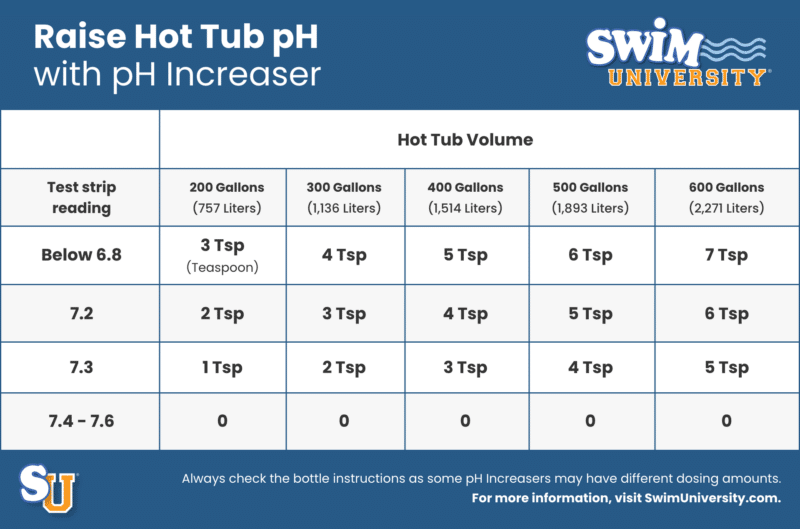
If you added too much, I wouldn’t worry. The worst case is you’ll have cloudy water for a bit. Your pH should come down sooner rather than later. But if you want to lower pH quickly, you can add a pH Decreaser (sodium bisulfate). Also, check out our guide on how to lower the pH in a hot tub.
A Quick Word About Chemical Safety
I highly recommend using gloves (and goggles) when you handle any hot tub chemicals. Even baking soda can irritate your skin. It strips off the natural oils, leaving you with dry, itchy skin.
Frequently Asked Questions About pH in Hot Tubs
Got some more questions? We took the internet’s most frequently asked questions about raising the pH in the hot tub and answered all of them here.
How do you fix a low pH in a hot tub?
To fix a low pH level in a hot tub, you can use a pH increaser, which is sodium carbonate (soda ash). Gradually add the pH increaser and retest the water after each addition until the pH is between 7.4 and 7.6.
Can I use baking soda to raise the pH in my hot tub?
Yes, you can use baking soda (sodium bicarbonate) to raise the pH in your hot tub. Baking soda also increases total Alkalinity, which protects the pH level.
Can I use my hot tub if the pH is too high?
I don’t recommend it. High pH can cause skin irritation, ineffective sanitization, and calcium buildup scaling deposits on the hot tub’s surfaces and internal components.
What raises pH but not Alkalinity?
Soda ash (sodium carbonate is also sold as Washing Soda) raises pH without significantly impacting total alkalinity. It’s more concentrated than baking soda and better for adjusting pH alone.
Does shock raise pH?
Yes, shock can raise the pH level of hot tub water if they are chlorine-based. Non-chlorine shocks have less impact on pH. We recommend shocking with non-chlorine shock as regular maintenance.
How long does it take to raise pH in a hot tub?
It takes about 5 to 15 minutes if you keep the hot tub running while you add a pH Increaser or Baking Soda. It also depends on the size of the tub and the initial pH level.
Why is the pH in my hot tub so low?
Low pH in a hot tub can be caused by factors such as rainwater, heavy use, or the addition of chemicals like chlorine or bromine, which are acidic. It’s a small body of water, so your pH will change more frequently than a larger swimming pool would.
Is low pH bad for hot tubs?
Yes, low pH is bad for a hot tub. It can lead to corrosion of metal components, damage to the hot tub shell, irritation of skin and eyes, and reduced effectiveness of sanitizers.
3 More Ways We Can Help With Your Hot Tub
- Hot Tub Cheat Sheets (Free): Easy-to-use guides to help you keep your hot tub water balanced and sanitized.
- The Hot Tub Handbook: An illustrated guide to DIY hot tub care, including water chemistry, maintenance, troubleshooting, and more.
- The Hot Tub Care Course. You’ll get step-by-step videos and a step-by-step downloadable guide with everything you need to know about hot tub maintenance.

